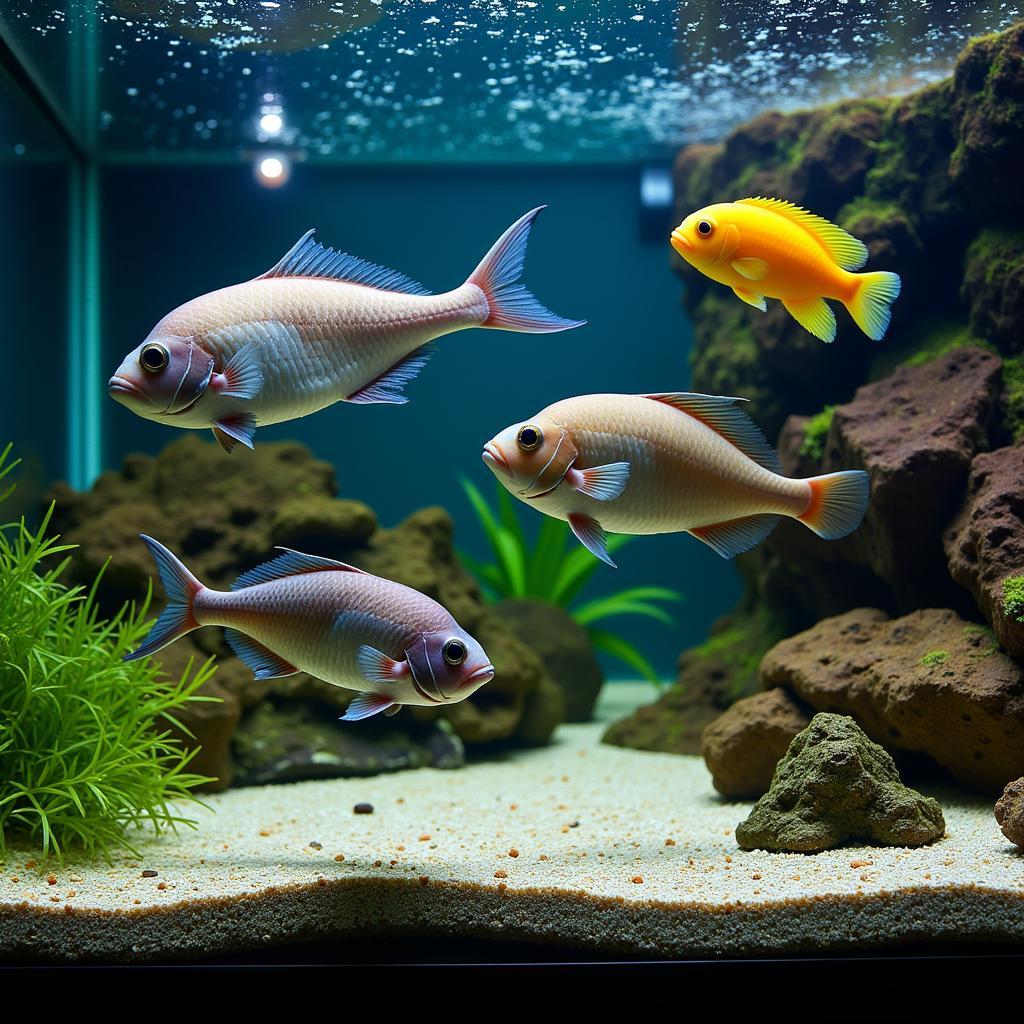Unveiling the Mystery: African Knife Fish Feeding
The African Knife Fish, a fascinating denizen of the murky depths, is a creature shrouded in mystery. These nocturnal predators, known for their sleek, elongated bodies and undulating movements, evoke a sense of both intrigue and awe. Among aquarists, their unique hunting techniques and dietary preferences are a source of endless fascination. This article delves into the world of “African Knife Fish Feeding,” exploring their natural diet, feeding habits in captivity, and essential tips to ensure their well-being.
The Hunt for Sustenance: African Knife Fish Diet in the Wild
In their natural habitat, African Knife Fish are opportunistic carnivores, meaning their diet consists primarily of meat. Their prey comprises a diverse array of aquatic creatures, including:
- Insect Larvae: These wriggling morsels form a significant portion of their diet, providing essential nutrients for growth and development.
- Small Fish: Agile hunters, African Knife Fish skillfully stalk and capture small fish, utilizing their electrosensory abilities to navigate murky waters.
- Crustaceans: Tiny shrimp, snails, and other invertebrates add variety and essential minerals to their diet.
Their feeding behavior is a testament to their adaptability. They are primarily nocturnal hunters, relying on their heightened senses of smell, touch, and electroreception to locate prey in low-light conditions.
Aquarist’s Guide: Feeding African Knife Fish in Captivity
Replicating their natural diet in captivity is crucial for their health and vitality. Here’s a comprehensive guide to feeding your African Knife Fish:
- Live Foods: Offer a variety of live foods like bloodworms, blackworms, brine shrimp, and small feeder fish. Live foods entice their natural hunting instincts and provide mental stimulation.
- Frozen Foods: Frozen options like bloodworms, brine shrimp, and mysis shrimp offer convenience and nutritional value. Thaw frozen food thoroughly before feeding.
- Pellets: While not their primary food source, high-quality sinking pellets specifically formulated for carnivorous fish can supplement their diet.
Feeding Frequency:
- Juveniles: Feed young fish twice a day, offering small portions.
- Adults: Feed adults once a day, adjusting portions based on their activity level and size.
Important Considerations:
- Avoid Overfeeding: Overfeeding can lead to water quality issues and health problems. Observe their feeding response and adjust portions accordingly.
- Water Parameters: Maintain pristine water conditions to ensure their well-being. Regular water changes and proper filtration are essential.
A Harmonious Habitat: Tank Mates for African Knife Fish
Choosing suitable tank mates for your African Knife Fish requires careful consideration.
- Compatible Options: Consider larger, peaceful species like some African Butterfly Cichlids or other peaceful community fish that are too large to be considered prey.
- Incompatible Choices: Avoid housing them with aggressive or much smaller fish that they might view as food.
 African Knife Fish Tank Mates
African Knife Fish Tank Mates
Common Questions about African Knife Fish Feeding
Q: Can African Knife Fish eat goldfish?
While goldfish might seem like an easy option, they are not recommended as a staple food. Goldfish can carry parasites and lack the necessary nutrients for long-term health.
Q: How do I know if my African Knife Fish is eating enough?
Observe their behavior and body condition. A healthy fish will be active, have a plump belly, and readily accept food.
Ensuring a Thriving Aquarium
Understanding the feeding habits and dietary needs of your African Knife Fish is fundamental to their well-being. By providing a varied diet, maintaining pristine water conditions, and choosing suitable tank mates, you can create a thriving habitat for these enigmatic creatures.
For further insights into caring for African Knife Fish and creating a thriving aquatic environment, explore our articles on specific species, such as the African Black Knife Fish and the African Ghost Knife Fish, or delve into the world of African Knife Fish with Cichlids. Remember, a well-informed aquarist is the key to a thriving aquatic community.
Need help with setting up a stunning 55-gallon African cichlid tank? Our expert team is here to assist you! Contact us at +255768904061, email us at kaka.mag@gmail.com, or visit our office located at Mbarali DC Mawindi, Kangaga, Tanzania. We provide 24/7 customer support.

